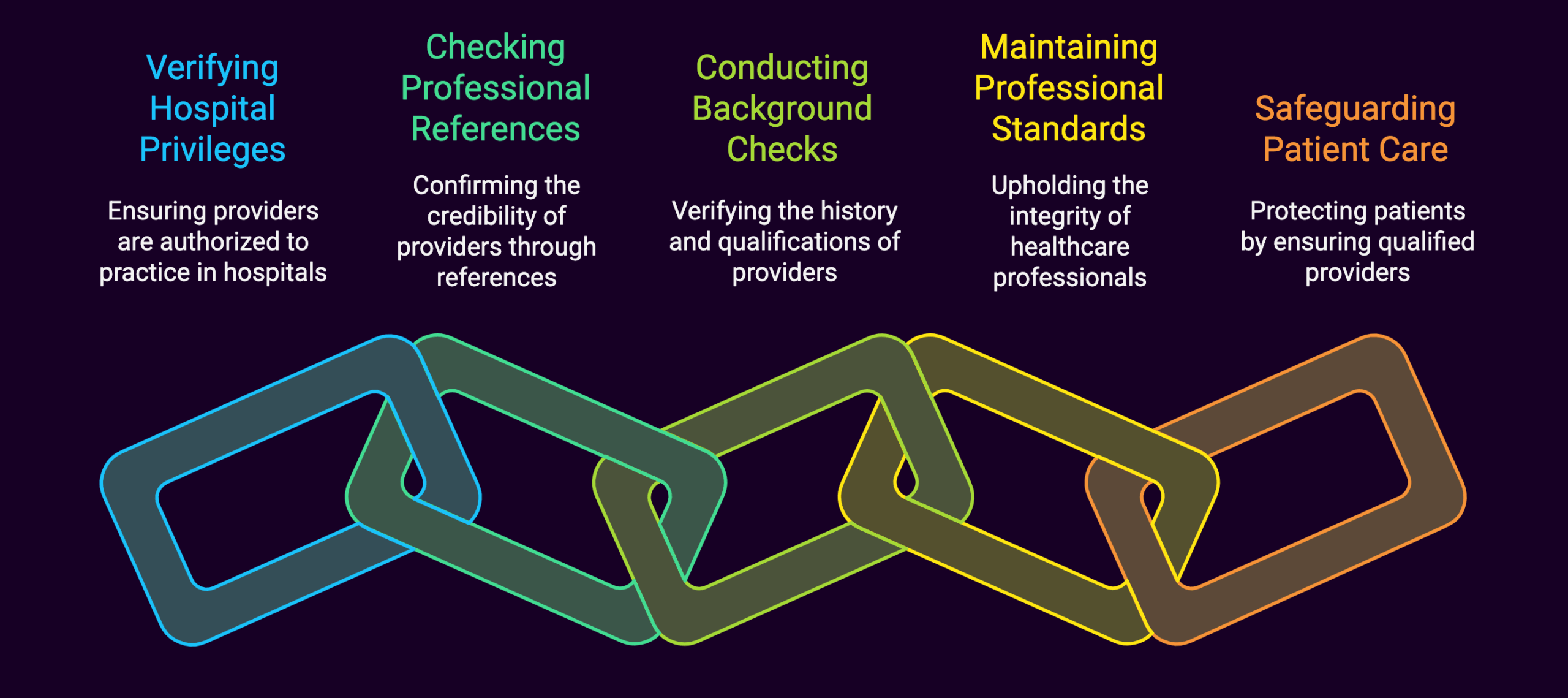The healthcare industry has undergone a dramatic transformation in recent years, with remote work becoming not just acceptable but essential in many sectors. Among the most promising areas for remote healthcare careers is medical credentialing, a critical behind-the-scenes process that ensures healthcare providers meet the necessary qualifications to deliver patient care. Healthcare organizations increasingly recognize the efficiency and cost-effectiveness of remote credentialing operations. Hence, opportunities for skilled professionals to work from home in this field have expanded significantly.
Medical Credentialing Essentials
 Medical credentialing is the systematic process of verifying and assessing the qualifications, competence, and professional standing of healthcare providers. This comprehensive evaluation ensures that physicians, nurses, therapists, and other medical professionals possess the necessary education, training, experience, and credentials to provide safe, quality patient care within a healthcare organization or insurance network.
Medical credentialing is the systematic process of verifying and assessing the qualifications, competence, and professional standing of healthcare providers. This comprehensive evaluation ensures that physicians, nurses, therapists, and other medical professionals possess the necessary education, training, experience, and credentials to provide safe, quality patient care within a healthcare organization or insurance network.
 The credentialing process involves meticulous verification of multiple components including medical education, residency and fellowship training, board certifications, state medical licenses, malpractice insurance, work history, and any disciplinary actions or sanctions. Additionally, credentialing specialists must verify hospital privileges, professional references, and conduct background checks to ensure providers meet the highest standards of professional conduct.
The credentialing process involves meticulous verification of multiple components including medical education, residency and fellowship training, board certifications, state medical licenses, malpractice insurance, work history, and any disciplinary actions or sanctions. Additionally, credentialing specialists must verify hospital privileges, professional references, and conduct background checks to ensure providers meet the highest standards of professional conduct.
This process is not merely administrative busy work but serves as a fundamental safeguard in healthcare delivery. Proper credentialing protects patients by ensuring their providers are qualified and competent, shields healthcare organizations from liability risks, and maintains compliance with regulatory requirements from bodies such as the Joint Commission, Centers for Medicare & Medicaid Services (CMS), and the National Committee for Quality Assurance (NCQA).
The Critical Need for Medical Credentialing
The healthcare landscape has become increasingly complex, with providers practicing across multiple states, telemedicine expanding rapidly, and regulatory requirements becoming more stringent. This complexity has created an unprecedented demand for skilled credentialing professionals who can navigate the intricate web of requirements while maintaining efficiency and accuracy.
Healthcare organizations face mounting pressure to streamline their credentialing processes while ensuring thoroughness and compliance. The traditional model of maintaining large in-house credentialing departments has proven costly and inefficient for many organizations, particularly smaller practices and rural healthcare facilities. This has led to a growing trend toward outsourcing credentialing functions to specialized remote teams that can provide expertise, efficiency, and cost savings.
The COVID-19 pandemic accelerated the adoption of remote work in healthcare administration, proving that many credentialing functions could be performed effectively from home. This shift has opened new opportunities for skilled professionals to enter the field without geographic constraints, while providing healthcare organizations access to a broader talent pool.
Essential Skills and Qualifications
Remote medical credentialing positions require a unique combination of technical knowledge, attention to detail, and communication skills. Successful credentialing specialists must possess a thorough understanding of healthcare regulations, accreditation standards, and the credentialing process itself.
Educational requirements typically include a bachelor’s degree in healthcare administration, business, or a related field, though some positions may accept equivalent experience in lieu of formal education. Many employers prefer candidates with specific credentialing certifications such as the Certified Provider Credentialing Specialist (CPCS) designation from the National Association Medical Staff Services (NAMSS) or the Certified Medical Services Professional (CMSP) certification.
Technical skills are crucial for remote credentialing work, as specialists must be proficient in credentialing software systems, electronic databases, and document management platforms. Familiarity with credentialing verification organizations (CVOs) and primary source verification processes is essential. Additionally, remote workers must be comfortable with various communication technologies and collaboration tools to effectively interact with healthcare providers, administrators, and regulatory bodies.
Attention to detail cannot be overstated in credentialing work, as even minor errors can lead to compliance issues, delayed provider onboarding, or patient safety concerns. Strong organizational skills, time management abilities, and the capacity to manage multiple cases simultaneously are fundamental requirements for success in this field.
Types of Remote Medical Credentialing Jobs
The remote medical credentialing field offers diverse career opportunities across various healthcare sectors. Hospital systems increasingly employ remote credentialing specialists to manage physician and allied health professional credentialing for their facilities. These positions often involve working with large, complex healthcare networks that require coordination across multiple locations and service lines.
 Insurance companies and managed care organizations represent another significant source of remote credentialing opportunities. These employers need specialists to credential healthcare providers for their networks, ensuring that covered members have access to qualified providers while maintaining cost control and quality standards.
Insurance companies and managed care organizations represent another significant source of remote credentialing opportunities. These employers need specialists to credential healthcare providers for their networks, ensuring that covered members have access to qualified providers while maintaining cost control and quality standards.
Third-party credentialing organizations and consulting firms have emerged as major employers in this space, offering specialized services to healthcare organizations that prefer to outsource their credentialing functions. These companies often provide the most flexible remote work arrangements and may offer opportunities to work with diverse client bases.
Telehealth companies have created new niches in remote credentialing, requiring specialists who understand the unique challenges of credentialing providers for virtual care delivery across multiple states. This growing sector requires expertise in state-specific telemedicine regulations and multi-state licensing requirements.
The Remote Work Process
Remote medical credentialing work typically follows a structured process that begins with initial application review and extends through ongoing monitoring and recredentialing. Credentialing specialists working remotely must establish efficient workflows that ensure thorough verification while maintaining productivity and meeting deadlines.
The process begins when a healthcare provider submits an application for credentialing or network participation. Remote credentialing specialists review applications for completeness, accuracy, and compliance with organizational requirements. This initial review often involves extensive communication with providers to clarify information or request additional documentation.
Primary source verification represents the core of the credentialing process, requiring specialists to directly contact educational institutions, licensing boards, certification bodies, and previous employers to verify the provider’s credentials. Remote workers must be skilled in navigating various verification systems and maintaining detailed documentation of their verification efforts.
Quality assurance and compliance monitoring are ongoing responsibilities that remote credentialing specialists must manage effectively. This includes tracking credential expiration dates, monitoring for disciplinary actions or sanctions, and ensuring that all credentialing decisions are properly documented and justified.
Technology and Tools
Remote medical credentialing relies heavily on specialized software and technology platforms that enable efficient credentialing. Most healthcare organizations utilize credentialing management systems that automate many aspects of the verification process, track application status, and maintain comprehensive provider databases.
 Cloud-based credentialing platforms have become increasingly popular, offering remote workers secure access to credentialing information from any location. These systems often integrate with other healthcare technologies, such as electronic health records and provider directories, creating seamless workflows for credentialing specialists.
Cloud-based credentialing platforms have become increasingly popular, offering remote workers secure access to credentialing information from any location. These systems often integrate with other healthcare technologies, such as electronic health records and provider directories, creating seamless workflows for credentialing specialists.
Communication tools play a crucial role in remote credentialing work, as specialists must maintain regular contact with healthcare providers, administrative staff, and regulatory bodies. Video conferencing, secure messaging platforms, and collaboration tools enable effective communication while maintaining the confidentiality required in healthcare settings.
Document management systems are essential for remote credentialing work, as specialists must securely store, organize, and retrieve large volumes of sensitive documentation. These systems must comply with healthcare privacy regulations while providing efficient access to credentialing information.
Challenges and Solutions
Remote medical credentialing work presents unique challenges that professionals must navigate to ensure success. Communication barriers can arise when working with healthcare providers who may be unfamiliar with remote credentialing processes or prefer face-to-face interactions. Successful remote credentialing specialists develop strong communication skills and utilize various channels to maintain effective relationships with providers and colleagues.
Time zone differences can complicate remote credentialing work, particularly when verifying credentials across multiple states or working with national healthcare organizations. Remote workers must develop strategies for managing these differences while maintaining productivity and meeting deadlines.
Security and confidentiality concerns are paramount in remote credentialing work, as specialists handle sensitive personal and professional information about healthcare providers. Remote workers must implement robust security measures, including secure internet connections, encrypted communication channels, and proper data storage protocols.
Maintaining work-life balance can be challenging for remote credentialing specialists, as the nature of the work often requires flexibility to accommodate provider schedules and urgent credentialing needs. Successful remote workers establish clear boundaries and develop strategies for managing their time effectively.
Career Advancement and Opportunities
The remote medical credentialing field offers numerous opportunities for career advancement and professional growth. Entry-level positions often provide comprehensive training and mentorship opportunities, allowing new professionals to develop expertise in credentialing processes and regulations.
 Experienced credentialing specialists can advance to supervisory or management roles, overseeing teams of remote credentialing professionals and managing complex credentialing projects. These positions often involve strategic planning, process improvement, and client relationship management.
Experienced credentialing specialists can advance to supervisory or management roles, overseeing teams of remote credentialing professionals and managing complex credentialing projects. These positions often involve strategic planning, process improvement, and client relationship management.
Specialization opportunities exist within the field, with some professionals focusing on specific areas such as physician credentialing, allied health professional credentialing, or telemedicine credentialing. Others may specialize in particular healthcare sectors, such as hospital systems, insurance companies, or specialty practices.
Entrepreneurial opportunities also exist for experienced credentialing professionals who may choose to establish their own credentialing consulting firms or contract services. This path offers the potential for greater flexibility and earning potential while providing valuable services to healthcare organizations.
The Future of Remote Medical Credentialing
The future of remote medical credentialing appears bright, with continued growth expected as healthcare organizations increasingly recognize the benefits of remote work arrangements. Technological advances will likely continue to streamline credentialing processes, making remote work even more efficient and effective.
The expansion of telemedicine and multi-state healthcare delivery will create new challenges and opportunities for remote credentialing specialists. These trends will require professionals who understand the complexities of multi-state licensing, telemedicine regulations, and virtual care delivery models.
Artificial intelligence and automation technologies may transform certain aspects of credentialing work, potentially automating routine verification tasks while allowing credentialing specialists to focus on more complex analysis and decision-making responsibilities.
The ongoing, dynamic updates of healthcare regulations and accreditation standards will continue to create demand for skilled credentialing professionals who can navigate these changes while ensuring compliance and quality care delivery.
Summary: Remote Credentialing Jobs
![]() Remote medical credentialing represents a growing and rewarding career opportunity for healthcare administration professionals. The field offers the flexibility of remote work while contributing to the critical mission of ensuring quality healthcare delivery. Healthcare providers are embracing remote work models and seek efficient solutions for credentialing challenges, opportunities for skilled professionals in this field will continue to expand.
Remote medical credentialing represents a growing and rewarding career opportunity for healthcare administration professionals. The field offers the flexibility of remote work while contributing to the critical mission of ensuring quality healthcare delivery. Healthcare providers are embracing remote work models and seek efficient solutions for credentialing challenges, opportunities for skilled professionals in this field will continue to expand.
Success in remote medical credentialing requires a combination of technical knowledge, attention to detail, communication skills, and adaptability to changing healthcare environments. For those willing to develop these skills and commit to ongoing professional development, remote medical credentialing offers a stable, meaningful career path with opportunities for growth and advancement.
Contact us, we’ll assist you with all of your credentialing needs and/or challenges.

